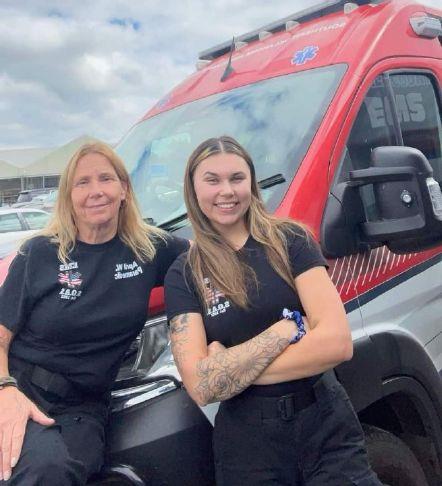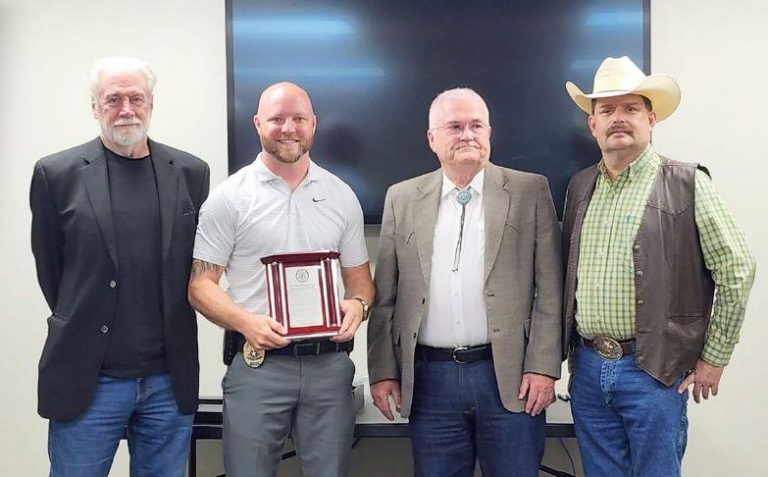A group of Southern Oklahoma Ambulance Service employees have joined first responders from across the nation to provide relief in Florida and North Carolina.
Travis Reeves has mobilized to North Carolina with Medical Global Response and Brock Mayer is in Florida with Gideon Rescue.
April Weisler and Rosslynne Echols were mobilized with SOAS to Florida as part of the Hurricane Milton rescue effort.
“We sent our crew out on a contract with Pafford Ambulance Services,” SOAS Executive Director Bob Hargis said. “Pafford is one of two companies that has the federal contract for responses. So, we are in contract with Pafford, and our crew was sent out with the Pafford bunch under their direction.”
Hargis said SOAS has not sent anybody this far away in the last few years due to staff limitations. It is one of the first years where the service has been fully staffed with enough ambulances to send someone away for an extended period.
“This was also a cry of desperation,” Hargis said. “We got calls from Pafford that there were still needing 150 ambulances in Florida, and they were really pressing with pleas, and send help. And we were in a better staffing position.”
Operations Director Jeff Taylor said a call for volunteers was sent out to all staff for the deployment. Criteria such as how shifts would be covered, when the volunteer’s last shift was and how rested were the volunteers was taken into account.
From that group, Weisler and Echols were selected for the 14-day deployment. Weisler, who is a paramedic, is a 20-year EMS veteran as well as a military veteran.
Weisler and Echols left out at 10:30 p.m., Oct. 5, to rendezvous with Marshall, Johnston and Bryan County first responders. The group left together at midnight for Florida.
“We have been in contact with them every day since they deployed, from the time they left here to today,” Taylor said. “It has been constant contact. They have let us know the situation and where they are staging.”
Taylor said Weisler and Echols have staged in three different locations, including heading to Miami before Hurricane Milton made landfall last week. It was the first night they had been able to sleep in a bed since they had left Ardmore. The previous days had been in their ambulance or on a cot at Tropicana Field, which lost its top during the hurricane.
Weisler and Echols have typically started their day at 6 a.m. with patient transfers. They worked 20-hour days for the first couple of days. When they got to Miami, it was a 16-hour day, the shortest they had to date. Hargis said both Weisler and Echols described it as chaos leading to the arrival of the hurricane and were glad to get out of Tampa Bay when they did.
“They are tired, but they are doing good,” Hargis said. “They have done some 911 calls, but they have mostly done evacuations. They helped evacuate hospitals in the low-lying areas of Tampa and St. Petersburg. And then, they have moved to several places, but they have done both nursing home and hospital evacuations.”
In between transfers and calls, Weisler and Echols have had to find time to eat and even clean their clothes. Hargis said they were looking for a place to wash clothes on Thursday, even if it meant washing them in a bucket if they could find some water.
Getting fuel has also been an ongoing challenge. The command center has been busy directing first responders to fuel trucks.
“But we did send some pretty resilient employees,” Hargis said. “They both knew what they were getting into.”
After the Hurricane Milton made landfall, Weisler and Echols returned to northern part of Florida. Thursday, they were in the Lakeland area helping evacuate a hospital that was running on a generator.
Once the deployment is complete, Weisler and Echols will go through a debriefing. It will also include a rest period that will allow for recuperation.
“Then we will sit down with them, discuss it and see what they need,” Hargis said. “If they need any mental help visits, anything they need.”
Taylor said the debriefing will serve as an opportunity for SOAS to make sure its employees are prepared for the next time there is a mobilization.
“We will talk to them about the pros and the cons of the trip,” he said. “What can we improve on from our side if we sent somebody else. Is there a certain type of equipment, how much, more of what we can relate to other staff members that may deploy on what to expect in living conditions.
“It is going to be a full debrief from when they left to the time, they got back how we can improve on it, what we can learn from this and what we can pass on to other agencies.”



